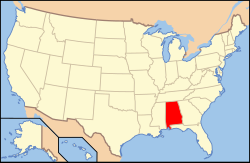Alabama Department of Corrections
| Alabama Department of Corrections | |
|---|---|
| Abbreviation | ADOC |

Seal
|
|
| Agency overview | |
| Formed | February 3, 1983 |
| Legal personality | Governmental: Government agency |
| Jurisdictional structure | |
| Operations jurisdiction* | State of Alabama, USA |
 |
|
| Map of Alabama Department of Corrections's jurisdiction. | |
| Size | 52,419 square miles (135,760 km2) |
| Population | 4,661,900 (2008 est.) |
| General nature | |
| Operational structure | |
| Headquarters | Montgomery, Alabama |
| Agency executives |
|
| Parent agency | Alabama Department of Corrections |
| Website | |
| ADOC Website | |
| Footnotes | |
| * Divisional agency: Division of the country, over which the agency has usual operational jurisdiction. | |
The Alabama Department of Corrections (ADOC), is the agency responsible for incarceration of convicted felons in the state of Alabama in the United States. It is headquartered in the Alabama Criminal Justice Center in Montgomery.
Alabama has struggled to handle a rising prison population after federal and state mandatory sentencing laws resulted in longer prison sentences. It operates the nation's most crowded prison system. In 2015 it housed more than 24,000 inmates in a system designed for 13,318. In 2015 it settled a class-action suit over physical and sexual violence against inmates at the Julia Tutwiler Prison for Women in Wetumpka. The department also spends the least of any state on a per-prisoner basis.
Additional lawsuits against ADOC allege that men also face physical and sexual violence in the overcrowded prisons. In October 2016, the US Department of Justice announced that it was conducting a statewide review and investigation of Alabama's men's prisons to evaluate conditions.
In his February 2017 State of the State address, Governor Robert Bentley proposed a three-faceted approach to overhaul the Department by upgrading and replacing outdated facilities, as well as creating centers to prepare inmates for re-entry to their communities.
Alabama prisoners have been required to work at farming and cotton plantations since the 1840s. Throughout the system's history, prisoners have served as farm laborers. In 2007 the prison system ended its farming programs, rendering many prisoners idle.
In 2016, Governor Robert Bentley proposed $800 million dollars in state bonds to build four large prisons, each with a designed capacity of 3,500 prisoners. This program would allow the state to close an unspecified number of older facilities. Press reports indicate the troubled Julia Tutwiler Prison for Women would be the first to be replaced; a federal class-action suit was settled in 2015 over abuse of women at that facility.
In October 2016, the US Department of Justice announced that it was conducting a review and investigation of Alabama's men's prisons to evaluate conditions as the Constitution promises humane treatment. "The investigation will focus on whether prisoners are adequately protected from physical harm and sexual abuse at the hands of other prisoners; whether prisoners are adequately protected from use of excessive force and staff sexual abuse by correctional officers; and whether the prisons provide sanitary, secure and safe living conditions."
...
Wikipedia
